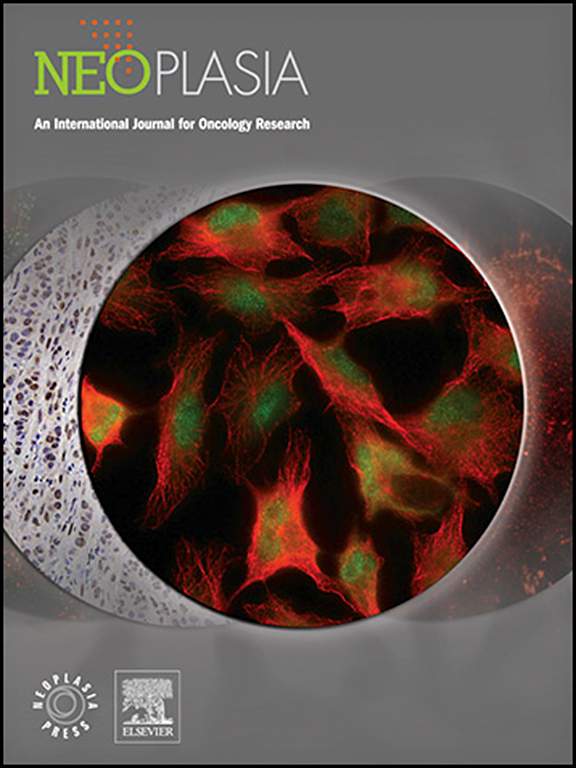USP20 通过与 YAP1 直接相互作用,介导膀胱癌的恶性表型变化。
IF 7.7
2区 医学
Q1 Biochemistry, Genetics and Molecular Biology
引用次数: 0
摘要
yes相关蛋白1 (YAP1)因其在治疗各种类型恶性肿瘤中的潜力而受到关注。Hippo-YAP1轴在膀胱癌(BC)中被抑制,这是BC进展和肿瘤发生的主要驱动因素。Hippo通路活性受MST1/2-LATS1/2-YAP1轴的磷酸化级联控制,此外还有其他修饰,如通过E3连接酶和去泛素酶的共同调控Hippo通路蛋白的泛素化。在这项研究中,我们通过联合siRNA筛选和去泛素酶过表达实验确定了USP20是一种与Hippo/YAP1通路相关的去泛素酶。进一步分析发现,USP20直接调控YAP1及其下游靶基因结缔组织生长因子和富半胱氨酸血管生成诱导剂61的表达。组织芯片检测证实USP20在肿瘤组织中的表达升高,并与YAP1表达相关。机制分析表明,USP20直接与YAP1蛋白相互作用,并通过抑制k48连接的多泛素化促进其稳定性。我们的研究结果表明,USP20作为去泛素酶在BC中调节Hippo-YAP1通路。本文章由计算机程序翻译,如有差异,请以英文原文为准。
USP20 mediates malignant phenotypic changes in bladder cancer through direct interactions with YAP1
Yes-associated protein 1 (YAP1) has attracted attention for its potential in the treatment of various types of malignancies. The Hippo-YAP1 axis is inhibited in bladder cancer (BC), which is a major driver of BC progression and oncogenesis. Hippo pathway activity is controlled by the phosphorylation cascade in the MST1/2-LATS1/2-YAP1 axis, in addition to other modifications such as ubiquitination of the Hippo pathway proteins through the co-regulation of E3 ligases and deubiquitinases. In this study, we identified USP20 as a Hippo/YAP1 pathway-related deubiquitinase using combined siRNA screening and a deubiquitinase overexpression assay. Further analysis revealed that USP20 directly regulated the expression of YAP1 and its downstream target genes connective tissue growth factor and cysteine-rich angiogenic inducer 61. A tissue microarray assay confirmed that USP20 expression was elevated in tumor tissues and correlated with YAP1 expression. Analysis of the underlying mechanisms revealed that USP20 directly interacted with the YAP1 protein and promoted its stability through inhibition of K48-linked poly-ubiquitination. Our findings revealed that USP20 serves as a deubiquitinase and regulates the Hippo-YAP1 pathway in BC.
求助全文
通过发布文献求助,成功后即可免费获取论文全文。
去求助
来源期刊

Neoplasia
医学-肿瘤学
CiteScore
9.20
自引率
2.10%
发文量
82
审稿时长
26 days
期刊介绍:
Neoplasia publishes the results of novel investigations in all areas of oncology research. The title Neoplasia was chosen to convey the journal’s breadth, which encompasses the traditional disciplines of cancer research as well as emerging fields and interdisciplinary investigations. Neoplasia is interested in studies describing new molecular and genetic findings relating to the neoplastic phenotype and in laboratory and clinical studies demonstrating creative applications of advances in the basic sciences to risk assessment, prognostic indications, detection, diagnosis, and treatment. In addition to regular Research Reports, Neoplasia also publishes Reviews and Meeting Reports. Neoplasia is committed to ensuring a thorough, fair, and rapid review and publication schedule to further its mission of serving both the scientific and clinical communities by disseminating important data and ideas in cancer research.
 求助内容:
求助内容: 应助结果提醒方式:
应助结果提醒方式:


